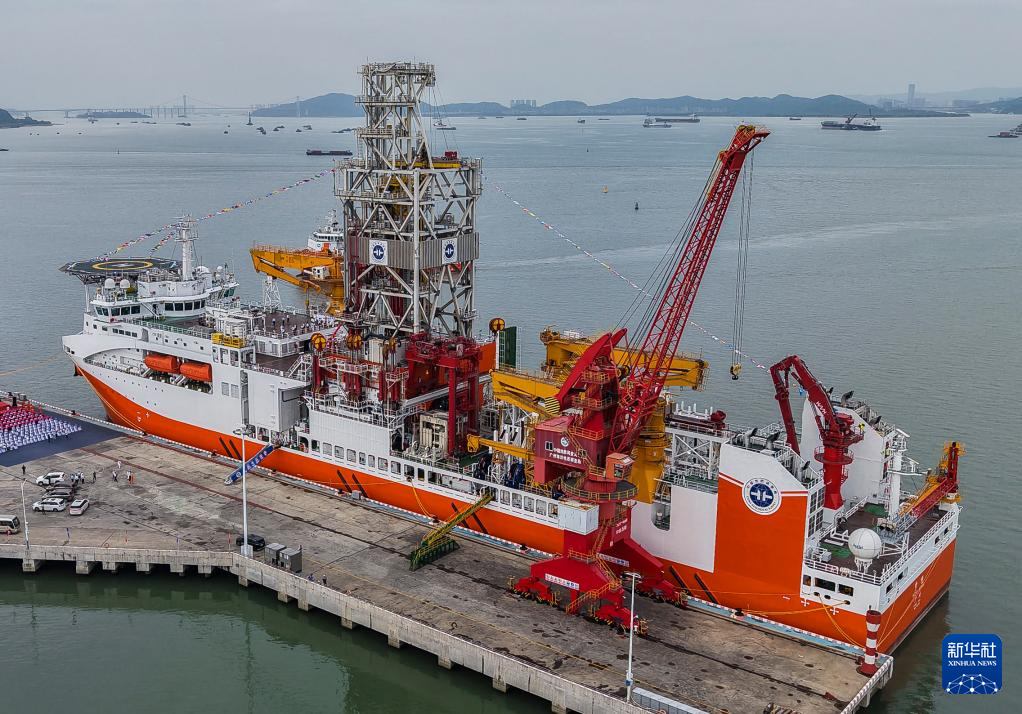Xi congratulates commissioning of China's deep-ocean drilling vessel

Chinese President Xi Jinping sent a congratulatory letter for the official commissioning of the country's first domestically designed and built deep-ocean drilling vessel Meng Xiang.
The Meng Xiang, which means dream in English, with a maximum drilling depth of 11 kilometers, was officially commissioned in Guangzhou, South China's Guangdong Province on Sunday. It marks a significant stride toward reaching where humanity has never ventured before, according to the Xinhua News Agency.
Xi, also general secretary of the Communist Party of China (CPC) Central Committee and chairman of the Central Military Commission, said that the successful sea trial and official commissioning of the Meng Xiang marked an important step of China's deep-ocean access, exploration and development.
It is another major achievement in improving the country's maritime and sci-tech strength, the letter noted.
Xi said that the workers engaged in the design and construction of the drilling vessel have overcome a number of world-class technical difficulties. He expects them to make good use of the major sci-tech device, strengthen innovation in marine science and technology and expand international maritime cooperation.
The commissioning ceremony was held on Sunday in Guangzhou. He Lifeng, a member of the Political Bureau of the CPC Central Committee and Vice Premier, attended the event and read out Xi's congratulatory letter.
As China's largest scientific research vessel, the Meng Xiang measures 179.8 meters in length and 32.8 meters in width, with a displacement of 42,600 tons. It boasts a range of 15,000 nautical miles (27,780 kilometers), and has a capacity for 180 people.
The Meng Xiang is currently the world's only deep-ocean drilling vessel that is capable of conducting ultra-deepwater drilling at depths of 11,000 meters. The vessel is scheduled to begin its inaugural ultra-deep drilling mission by the end of 2024, according to CCTV.
Designed to meet safety standards for super typhoons, Meng Xiang can operate normally in rough sea conditions and is capable of global missions in unrestricted waters, according to a statement posted on Sunday by China Geological Survey (CGS) under the Ministry of Natural Resources.
The vessel also meets the requirements for bridge passage and wharf docking in major sea areas around the world, said the CGS.
The successful commissioning of the deep-ocean drilling vessel will certainly bring great opportunities for resource exploration, Lin Boqiang, director of the China Center for Energy Economics Research at Xiamen University, told the Global Times on Sunday.
"The higher the technology level is, the lower the exploration costs are. The development of technology enables us to explore what we were unable to," Lin said.
Traditionally, human activities and scientific exploration have been limited to the Earth's crust, which averages 15 kilometers in thickness. Beneath the crust lies the mantle, a crucial layer linking the surface to the core. The commissioning of the Meng Xiang marks a significant stride for humanity to reach or even break through the boundary between the crust and mantle, known as the Mohorovicic discontinuity, or Moho, according to Xinhua.
The Meng Xiang is equipped with an internationally leading drilling and sampling system - four drilling modes and three coring methods, enabling various operational needs deep-ocean coring and deep-sea resource exploration. It is expected to help global scientists achieve the scientific dream of "penetrating the crust and entering the deep Earth," said the CGS.
With this ship, Chinese scientists will certainly make greater contributions to international deep ocean drilling, Tuo Shouting, director of the International Ocean Discovery Program (IODP)-China Office, told the Global Times in an exclusive interview in January.
"China has been a participant in the IODP for a long time. With the completion of the construction of the Meng Xiang, China will be able to independently organize expeditions, just like the US, Japan and Europe," Tuo said.
The deep-Earth core samples that the vessel retrieves will provide global scientists with direct evidence to study plate tectonics, oceanic crust evolution, ancient marine climates and the evolution of life, Xu Zhenqiang, director of th eGuangzhou Marine Geological Survey under the CGS, was quoted as saying by Xinhua.
"The Meng Xiang will aid humanity in better understanding, protecting and utilizing the oceans," said Xu.
The vessel is the first in the world to integrate functions such as deep-ocean scientific drilling, oil and gas exploration, and natural gas hydrate investigation and trial extraction. After two rounds of sea trials, its key performance indicators exceeded design expectations, according to Xinhua, which cited Zhang Haibin, chief designer of the Meng Xiang.